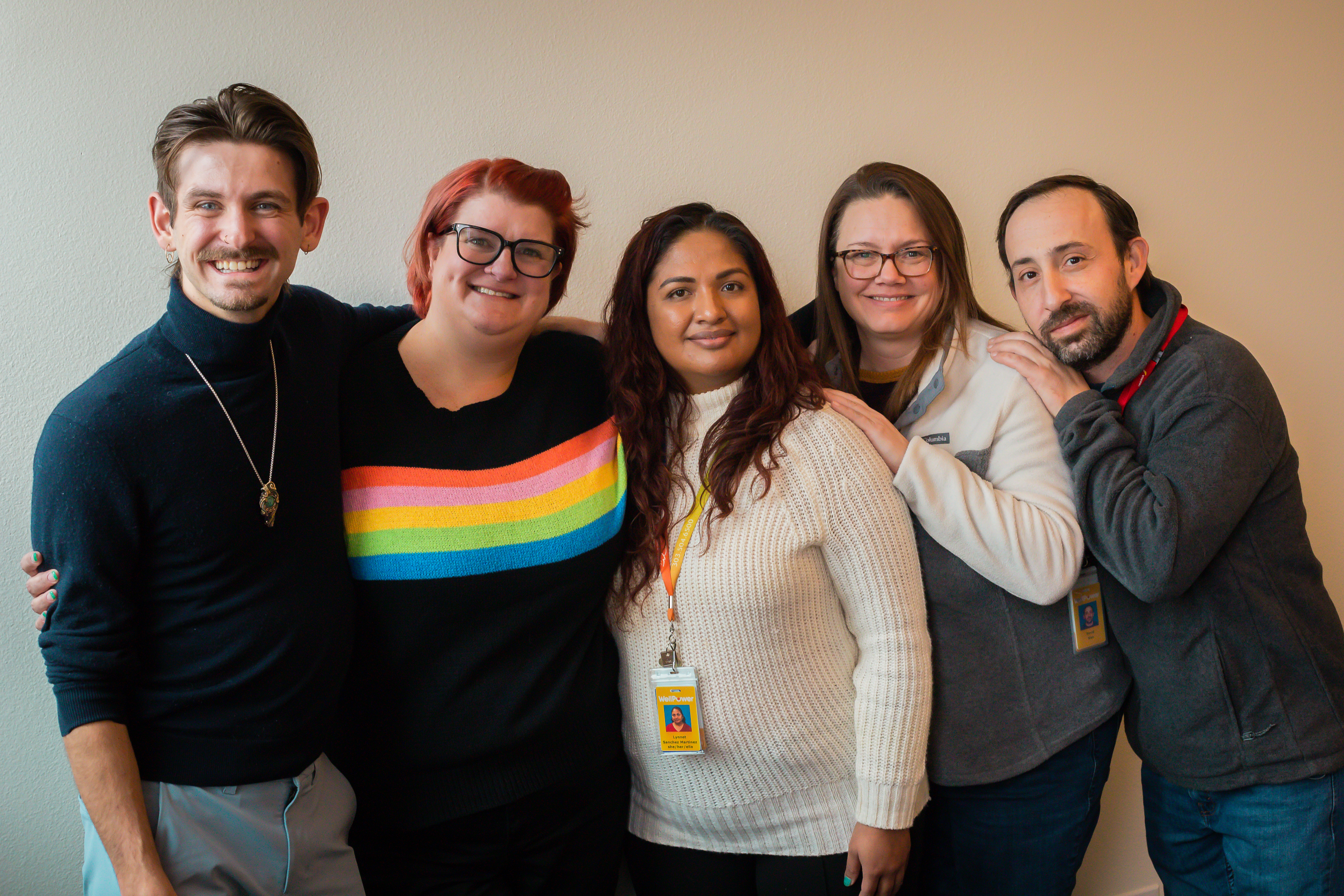From L to R: Jay Flanery, Lisa Stiefel, Lynnet Sanchez Martinez, Shannon Alicea and David Siso are WellPower’s Interpretation & Translation Services team
When a person seeking behavioral health care services comes to a community mental health center, they’ve already overcome a multitude of barriers like stigma and scarcity of resources. For a person who uses a language other than English, those obstacles to well-being can be greater. Historically (and in many cases currently) individuals who use languages like Spanish or American Sign Language (ASL) have come to behavioral health care settings seeking help only to find that their needs are not being met due to gaps in accessibility and cultural proficiency. At WellPower, the Interpretation & Translation Services team has as their mission to address and raise awareness of this issue through the lens of language justice.
“The term language justice might not be familiar for most people, but it is a key practice used in social justice movements in order to create shared power, practice inclusion and dismantle traditional systems of oppression that often disenfranchise non-English speakers,” explained Lisa Stiefel who leads the team. “What this means is that first, we are trying to increase access to interpreters who are qualified to interpret in health care settings, specifically behavioral health. Second, we aim to have materials and forms translated into the language the person we serve is most comfortable with, giving them autonomy to make decisions about their own well-being. And third, educating our own colleagues about these principles and how to incorporate them into the care they provide to people we serve.”
As part of WellPower’s Diversity, Equity and Inclusiveness department, the Interpretation & Translation Services team is made up of five full-time, nationally certified staff interpreters for Spanish and American Sign Language (ASL), and also works to coordinate interpretation and translation services in any language.
“There are so many layers to providing even just basic health care services for those who use a language other than English,” added Spanish interpreter Lynnet Sanchez-Martinez. “You need a qualified interpreter who is both culturally proficient enough to understand the nuances of the person’s lived experience – their vocabulary, their dialect and their culture – and an interpreter who is also well-versed in behavioral health so that vital information is not omitted. Being bilingual is not sufficient.”
Interpreter David Siso has seen what happens when interpretation services are not conducted in a culturally proficient way. “There’s a well-known case in health care interpretation, the case of Willie Ramirez. He arrived in a hospital emergency room after developing a terrible headache and difficulty staying conscious. His family, who were from Cuba and spoke Spanish, weren’t provided with a professional interpreter. In trying to describe Ramirez’ symptoms, they gave the doctors the word used in their culture to describe a malady based on something a person ate or drank: ‘intoxicado.’ Instead of treating what was ultimately discovered to be a brain hemorrhage, the hospital treated Ramirez for a drug overdose, and that mistake left him a quadriplegic for life.”
The need for equitable interpretation services is seen across all languages, as the interpreters for ASL can attest. “The best-case scenario is when people we serve don’t have to use us because they can work directly with a Deaf clinician,” commented ASL interpreter Shannon Alicea. “But when that’s not possible, having continuity of care with an interpreter in addition to a clinician is important. Having full-time staff available for interpretation makes all the difference in a place like WellPower, because we can provide the same interpreter at each appointment to help build that understanding and trusting relationship with their care team.”
“The term ‘accessibility’ has really evolved in recent years to go beyond just having access to someone who speaks your language and can help interpret,” added ASL interpreter Jay Flanery. “It’s about the redistribution of power to individuals who have been historically disenfranchised. Every interaction, even one as minor as rescheduling an appointment, needs to be as seamless and uncomplicated as it is for someone who uses English. Interpreters are there not just for the big conversations, but to provide access for every part of the process.”
“The behavioral health space needs to be truly accessible for all communities and integrating language justice principles throughout our services helps advance that goal,” finished Stiefel. “The ultimate aim is creating equitable access to whatever a person we serve may need.”


